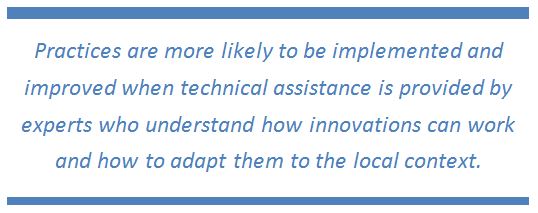Technology has become a critical element of innovation, and it has also become a very critical element in sustaining and scaling innovation. For example, technology applications for learning through online and open education resources are center stage today, as are technology applications to achieve greater efficiencies in delivery, administration, and assessment. Equally important is the application of technology to improve implementation, sustainability, and scaling. For example, social network mapping can be used to visually represent relationships among innovators and stakeholders to give insight into how innovations grow and change over time. They can illustrate weak and strong connections that indicate where additional resources are needed to encourage scaling.[1]
Finding expertise of this sort can be challenging, but the value of technical assistance cannot be overstated in the context of transformative change. How has technical assistance and technology been a part of sustaining and scaling innovation in your organization? What lessons can you share with others as they utilize technology to scale transformative change in the community college context?
[1] Rowson, J., Broome, S., & Jones, A. (2010). Connected communities: How social networks power and sustain the Big Society. London, England: RSA Projects. Retrieved from http://www.thersa.org/__data/assets/pdf_file/0006/333483/ConnectedCommunities_report_150910.pdf
This is the eighth post in a series about the Transformative Change Initiative (TCI) and is based on the 2014 TCI booklet. This post discusses the fifth guiding principle in the TCI Framework.
Dr. Debra Bragg, OCCRL director and endowed professor at Illinois, researches the transition to college by youth and adults, especially student populations that have not attended college historically.




